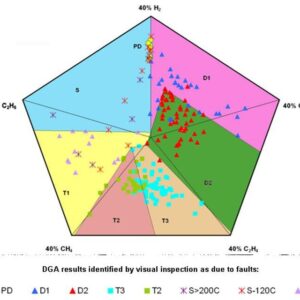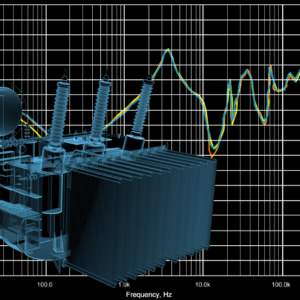Digital Chalk General Technical Training Maintenance Training Safety Training In-person Virtual
Showing 37–48 of 52 results
-

Power Factor Correction Series
*Need Digital Chalk account to sign up, click to create account.$185.00The power factor correction is a technique of increasing the power factor of a power supply. Switching power supplies without power factor correction draws current in short, high-magnitude pulses. These pulses can be smoothed out by using active or passive techniques, reducing the input RMS current and apparent input power, thereby increasing the power factor.
-

System Grounding Methods
*Need Digital Chalk account to sign up, click to create account.$95.00Resistance Grounding Systems are used in industrial electrical power distribution facilities to limit phase-to-ground fault currents. IEEE Standard 142-1991 states: “The reasons for limiting the current by resistance grounding may be one or more of the following:
-

Transformer – Power Factor and Tip-up Testing Series
*Need Digital Chalk account to sign up, click to create account.$185.00Most electrical equipment failures are the result of insulation deterioration. Power factor testing is the most effective and common way to detect insufficient electrical equipment insulation
-

Transformer – Power Factor and Tip-up Testing Series
*Need Digital Chalk account to sign up, click to create account.$185.00The power factor correction is a technique of increasing the power factor of a power supply. Switching power supplies without power factor correction draws current in short, high-magnitude pulses. These pulses can be smoothed out by using active or passive techniques, reducing the input RMS current and apparent input power, thereby increasing the power factor.
-

Transformer Testing – Dissolved Gas Analysis
*Need Digital Chalk account to sign up, click to create account.$95.00The detection of certain gases generated in an oil-filled transformer in service can be an indication of a malfunction that may eventually lead to failure if not corrected.
-

Transformer Testing – Oil Tests
*Need Digital Chalk account to sign up, click to create account.$95.00Insulating oils are used in power transformers to provide cooling, insulation, and protection against corona and arcing. Transformer oils are exposed to mechanical and electrical stress, as well as chemical contaminations during the operation of the transformer. These lead the original properties of the transformer oil to change, which can reduce the functionality of the oil.
-

Transformer Testing – Turns Ratio Measurements
*Need Digital Chalk account to sign up, click to create account.$95.00Measuring transformer ratio from one external terminal to another reveals a great deal of information about the transformer. Transformers are subject to mechanical impact and vibration. Problems or faults occur due to poor design, assembly, handling, poor environments, overloading, or poor maintenance. Measuring the polarity and turn ratio of a transformer winding assures that the connections are correct and that there are no severe mismatches or opens.
-

Transformer Testing – Winding Resistance Measurements
*Need Digital Chalk account to sign up, click to create account.$95.00Winding resistance measurements in transformers are of fundamental importance for the following purposes: calculations of the I2R component of conductor losses; calculation of winding temperature at the end of a temperature test cycle; and as a diagnostic tool for assessing possible damage in the field. The DC current not only flows through the winding of the device under test, but also through numerous welded and mechanical connections; in addition to the obvious faulted winding (such as an open winding or shorted turn), the test reveals more subtle problems.
-

Transformer Testing – Sweep Frequency Response Analysis
*Need Digital Chalk account to sign up, click to create account.$95.00Sweep frequency response is a major advance in transformer condition analysis, allowing visualization of the inside of a transformer’s tank without costly de-tanking. This is done by performing a simple measurement looking at how well a transformer winding transmits a low voltage signal that varies in frequency. Just how well a transformer does this is related to its impedance, the capacitive and inductive elements that are intimately related to the physical construction of the transformer.
-

Transformers – Demagnetization of Power Transformer Cores
*Need Digital Chalk account to sign up, click to create account.$95.00After a power or distribution transformer is disconnected from the power grid, or when a DC current is applied to it–for example, during a routine winding resistance measurement–the transformer core is likely to have some remnant magnetism. This remnant magnetism will generate high overcurrents when the transformer is re-energized, which is commonly known as Transformer Inrush Current.
-

Transformers – Excitation Current Testing Series
*Need Digital Chalk account to sign up, click to create account.$185.00The excitation test is one of many tests typically used to verify the overall “health” of the transformer; it is typically performed each time a large power transformer is tested. As with most routine testing results, it is compared to previous results to verify no major changes have occurred–and in the case of the excitation test, it gives an indication that the transformer core is electrically and mechanically sound.
-

Transformers – Working Principles
*Need Digital Chalk account to sign up, click to create account.$95.00With an understanding of the construction and maintenance of transformers, you will be able to make informed decisions about the performance and operation of this costly piece of equipment. This transformer training session provides a comprehensive overview of electrical transformers found in the industry.
Shermco
2425 East Pioneer Dr.
Irving, Texas 75061
Phone: 972.793.5523
Toll-Free: 888.SHERMCO
Fax: 972.793.5542
ONE LINE. ONE COMPANY.
©2025 Shermco
Privacy Policy | Site Map
2425 East Pioneer Dr.
Irving, Texas 75061
Phone: 972.793.5523
Toll-Free: 888.SHERMCO
Fax: 972.793.5542
ONE LINE. ONE COMPANY.
©2025 Shermco
Privacy Policy | Site Map
